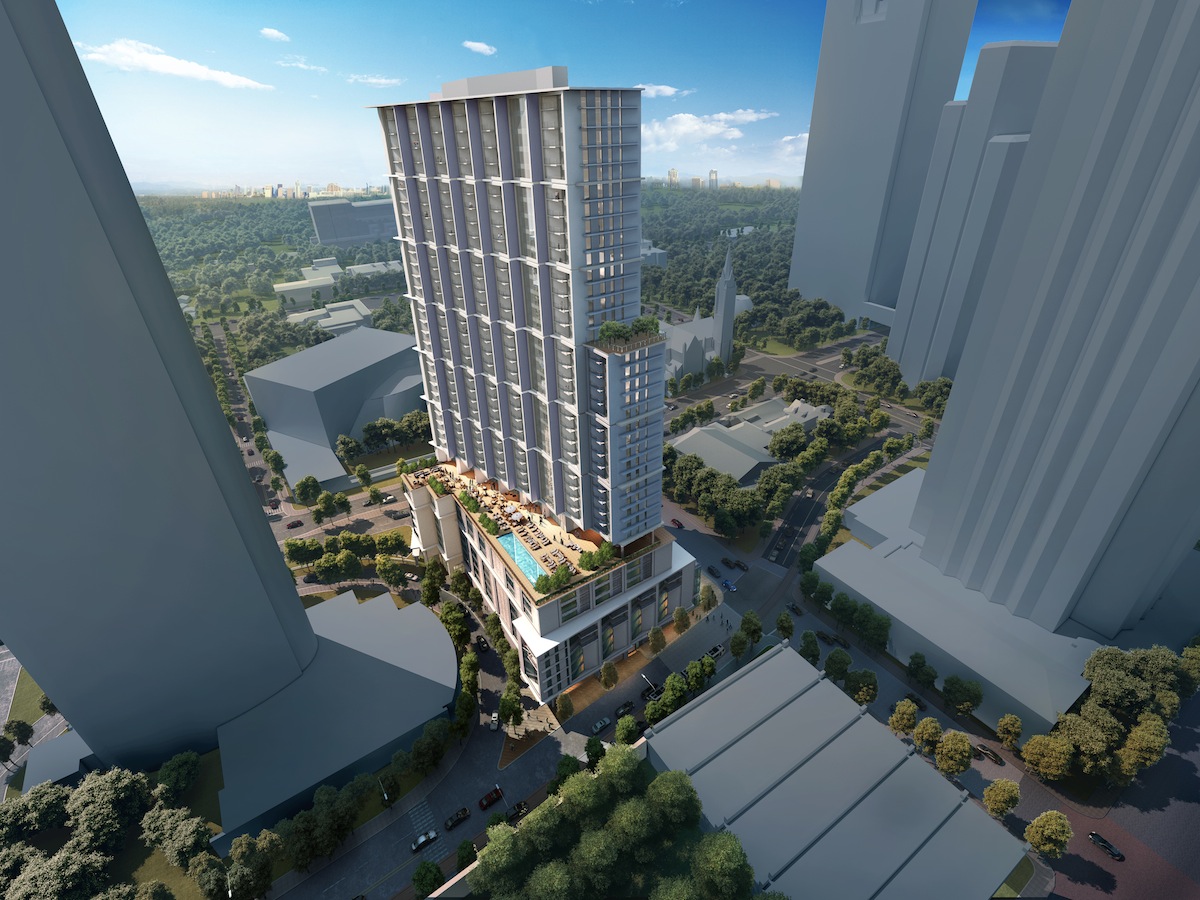A building in Dallas’s Arts District that will offer affordable live/work residences and spaces for artists is getting richer neighbors sooner than expected.
Flora Lofts, to be built on a one-acre parking lot next to this city’s Museum Tower, will provide affordable living spaces and services to artist-residents and their families through the nonprofit ownership of La Reunion TX, a 10-year-old organization that connects artists and art with communities.
Under a revised construction and ownership plan, Flora Lofts’ 39 rent-restricted Artists Residences and eight market-rate apartments will take up the first six floors of a 29-story, $100 million wedge-shaped high rise that also includes 370 luxury apartments, which will be marketed under the brand “Atelier.”
This site, which sits between the Nasher Sculpture Center and the Meyerson Symphony Center, is considered to be one of the last desirable undeveloped lots in Dallas. Construction is expected to begin in the fourth quarter of 2015, with a 24- to 28-month build out, reports the Dallas Morning News.
“Instead of doing it in two phases, we are doing it all at once,” explains Graham Greene, AIA, LEED AP BD+C, a principal with Oglesby Greene Architects, who since 1995 has owned the land the parking lot sits on. “Doing it all in one phase makes for a better building.” The lofts will be a mix of sizes, says Greene, with one, two, or three bedrooms.
Greene tells BD+C that the project always included a high-rise component. But it encountered some difficulty getting off the ground because of a disagreement over street access, which necessitated the project to reapply for a $2 million tax credit for low-income housing, according to the website Art Seek. That year-long delay prompted Greene to bring in ZOM Holdings USA, an apartment developer, as a partner to accelerate the construction. ZOM will own the luxury apartments at Atelier½ Flora Lofts and provide management services to La Reunion.
“ZOM gets affordable housing,” Greene says. And Hans van Veggel, chairman and chief creative officer of ZOM’s Holland-based parent, says that the prospect of incorporating live/work space for artists into the high rise “is what first drew our interest to this opportunity."
La Reunion TX will identify and qualify potential loft residents. And a third partner, METROarts Properties, will own the subsurface parking. (The residential tower will sit over nine floors of podium parking and 12,000 sf of ground-floor retail.)
Boston-based Add Inc. designed the building. According to D Magazine, ZOM has promised that the high rise would be built in a way so that its windows don’t direct more heat from the sun onto The Nasher.
Atelier | Flora Lofts is one of at least seven high-rise residential buildings in various stages of planning, development, or construction around Dallas’s Klyde Warren Park and Victory Park.
Related Stories
Urban Planning | Jun 15, 2023
Arizona limits housing projects in Phoenix area over groundwater supply concerns
Arizona will no longer grant certifications for new residential developments in Phoenix, it’s largest city, due to concerns over groundwater supply. The announcement indicates that the Phoenix area, currently the nation’s fastest-growing region in terms of population growth, will not be able to sustain its rapid growth because of limited freshwater resources.
Multifamily Housing | Jun 15, 2023
Alliance of Pittsburgh building owners slashes carbon emissions by 45%
The Pittsburgh 2030 District, an alliance of property owners in the Pittsburgh area, says that it has reduced carbon emissions by 44.8% below baseline. Begun in 2012 under the guidance of the Green Building Alliance (GBA), the Pittsburgh 2030 District encompasses more than 86 million sf of space within 556 buildings.
Industry Research | Jun 15, 2023
Exurbs and emerging suburbs having fastest population growth, says Cushman & Wakefield
Recently released county and metro-level population growth data by the U.S. Census Bureau shows that the fastest growing areas are found in exurbs and emerging suburbs.
Engineers | Jun 14, 2023
The high cost of low maintenance
Walter P Moore’s Javier Balma, PhD, PE, SE, and Webb Wright, PE, identify the primary causes of engineering failures, define proactive versus reactive maintenance, recognize the reasons for deferred maintenance, and identify the financial and safety risks related to deferred maintenance.
Mixed-Use | Jun 12, 2023
Goettsch Partners completes its largest China project to date: a mixed-used, five-tower complex
Chicago-based global architecture firm Goettsch Partners (GP) recently announced the completion of its largest project in China to date: the China Resources Qianhai Center, a mixed-use complex in the Qianhai district of Shenzhen. Developed by CR Land, the project includes five towers totaling almost 472,000 square meters (4.6 million sf).
Mixed-Use | Jun 6, 2023
Public-private partnerships crucial to central business district revitalization
Central Business Districts are under pressure to keep themselves relevant as they face competition from new, vibrant mixed-use neighborhoods emerging across the world’s largest cities.
Multifamily Housing | Jun 6, 2023
Minnesota expected to adopt building code that would cut energy use by 80%
Minnesota Gov. Tim Walz is expected to soon sign a bill that would change the state’s commercial building code so that new structures would use 80% less energy when compared to a 2004 baseline standard. The legislation aims for full implementation of the new code by 2036.
Student Housing | Jun 5, 2023
The power of student engagement: How on-campus student housing can increase enrollment
Studies have confirmed that students are more likely to graduate when they live on campus, particularly when the on-campus experience encourages student learning and engagement, writes Design Collaborative's Nathan Woods, AIA.
Multifamily Housing | Jun 1, 2023
Income-based electric bills spark debate on whether they would harm or hurt EV and heat pump adoption
Starting in 2024, the electric bills of most Californians could be based not only on how much power they use, but also on how much money they make. Those who have higher incomes would pay more; those with lower incomes would see their electric bills decline - a concept known as income-based electric bills.
Multifamily Housing | May 30, 2023
Boston’s new stretch code requires new multifamily structures to meet Passive House building requirements
Phius certifications are expected to become more common as states and cities boost green building standards. The City of Boston recently adopted Massachusetts’s so-called opt-in building code, a set of sustainability standards that goes beyond the standard state code.

















